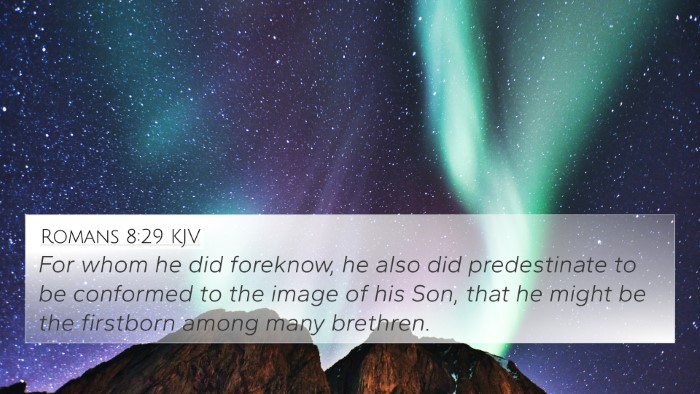Understanding John 6:64
John 6:64 states, "But there are some of you that believe not. For Jesus knew from the beginning who they were that believed not, and who should betray him." This verse reveals the tension between belief and disbelief among Jesus' followers, emphasizing His omniscience and foreknowledge. Below is a deeper examination of this verse through insights drawn from public domain commentaries by Matthew Henry, Albert Barnes, and Adam Clarke.
Meaning and Interpretation
This verse is pivotal as it highlights the challenge Christ faced even among those closest to Him. Let’s explore the combined insights from the three esteemed commentaries:
Matthew Henry's Commentary
Matthew Henry emphasizes the reality of unbelief amidst those who profess faith. He notes that Jesus, knowing the hearts of men, was aware of those who truly believed and those who did not. He points out that despite visible signs and miracles, some hearts remained hardened. Henry interprets this as a necessary warning to contemporary believers about the importance of genuine faith and the dangers of self-deception.
Albert Barnes' Notes
Albert Barnes elaborates on the implications of Jesus' foreknowledge in this passage. He comments that Christ not only predicted Judas' betrayal but also understood the varying degrees of faith among His disciples. Barnes stresses the importance of recognizing that being near Christ physically does not equate to spiritual closeness. He invites readers to reflect on their own faith, reminding them that true belief is demonstrated through actions and heart posture towards God.
Adam Clarke's Commentary
Adam Clarke provides a detailed analysis, suggesting that this verse serves to highlight the division between those who accept the profound truths taught by Jesus and those who reject them. Clarke emphasizes the personal nature of Christ's knowledge about His followers, suggesting He knows who will ultimately reject Him. This awareness underscores the theme of accountability and the necessity of sincere belief in Christ's teachings.
Bible Cross-References
John 6:64 relates to several significant biblical themes and verses. A proper understanding encompasses cross-referencing these to highlight the interconnectedness of Scripture. Here are noted verses that provide deeper insight:
- Matthew 7:21-23: This passage elaborates on the distinction between mere profession and true discipleship.
- John 2:24-25: Here, we see a reflection of Jesus’ knowledge regarding the hearts of men.
- Luke 22:3-6: This accounts the moment Judas Iscariot is tempted and ultimately betrays Christ.
- Hebrews 4:12: Demonstrates how God's word discerns the thoughts and intents of the hearts.
- John 10:26: Jesus points out that those who do not believe are not part of His flock.
- Matthew 13:57: Illustrates the concept of disbelief in Jesus due to familiarity.
- John 15:16-19: Discusses the theme of chosen versus unchosen, reinforcing the idea of belief impacting relationship with Christ.
Connections Between Bible Verses
Connecting verses allows for a thematic Bible verse understanding, providing a fuller picture of scriptural meaning. The act of cross-referencing biblical texts is critical, revealing profound truths that may not be evident when verses are read in isolation.
The following insights illustrate the importance of linking Bible scriptures related to belief and Christ's awareness:
- Exploring how John 6:64 links to James 2:19: "Thou believest that there is one God; thou doest well: the devils also believe, and tremble," highlights that mere acknowledgment of Christ is insufficient without sincere belief.
- Connecting to 1 John 2:19: This verse talks about those who went out from us yet were not of us, paralleling the idea of false belief detailed in John 6:64.
- Integrating Mark 4:12: "That seeing they may see, and not perceive; and hearing they may hear, and not understand," reinforces the challenge of disbelief that persists despite Jesus' teaching.
Tools for Bible Cross-Referencing
Understanding how to navigate biblical texts through cross-referencing tools enhances deeper study and comprehension. Utilizing resources such as Bible concordances or a Bible cross-reference guide aids in unlocking the rich relationships between verses.
This technique not only enriches one’s personal study but also aids in sermon preparation, allowing for a comparative Bible verse analysis that strengthens theological understanding and application.
Final Thoughts
In summary, John 6:64 serves as a profound reminder of the nature of faith and the reality of Christ’s omniscience. Through the interpretative lenses of the noted commentators, believers are encouraged to examine their own faith and to actively engage with Scripture through diligent study and cross-referencing.
By understanding the connections between Bible verses and employing tools for cross-referencing, one can delve deeper into the richness of God's Word, fostering a robust and genuine faith that honors the teachings of Christ.



















